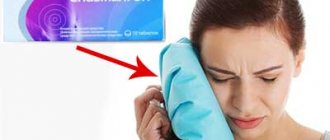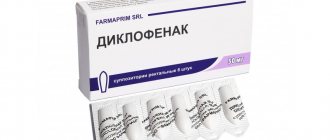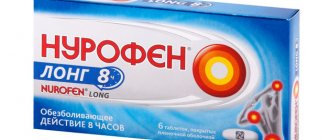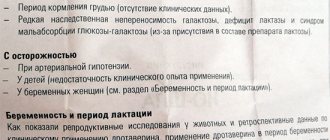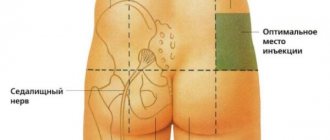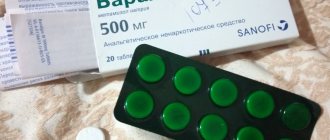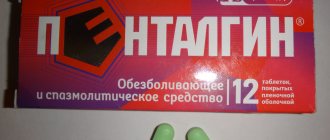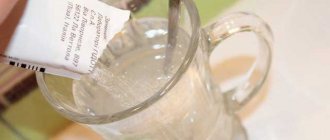TOP 12 drugs for toothache
Modern pain relievers help quickly eliminate toothache, but to achieve a 100% effect, it is important to know the principle of their action and recommendations for use.
Also, it is necessary to take into account the presence of side effects and contraindications.
Nimesil is a universal remedy, but not for everyone
It belongs to nimesulides and is not only an effective analgesic, but also a long-lasting anti-inflammatory agent.
actions.
Therefore, it is more often recommended for the development of acute pulpitis, accompanied by unbearable pain (the result is noticeable after 30 minutes).
The drug is also effective in the presence of complications of pulpitis in the form of periodontitis, which involves the inflammation of the tooth ligament. Also, Nimesil is indicated for relieving pain when hard dental tissue is destroyed due to caries or injury.
Contraindicated for use in children under 12 years of age, people with heart, liver or kidney failure, chronic diseases of the stomach and intestines, allergy sufferers, pregnant and nursing mothers.
The drug is taken a maximum of 2 times a day with an interval of 12 hours. For use, dilute 1 sachet of Nimesil in half a glass of boiled warm water.
Ketorol - will help where others fail
It is a strong analgesic that simultaneously provides an anti-inflammatory effect. Ketorol is indicated for acute intense toothache, if other drugs are not able to alleviate the condition. Its effectiveness is almost similar to morphine.
Due to the risk of liver and kidney dysfunction, it is recommended for a single dose only.
After taking 1 tablet of the medicine, improvement occurs after half an hour, and the maximum effect is observed after another hour.
The duration of pain relief is about 4 hours.
If the pain intensifies after 4-5 hours, you are allowed to take 1 more tablet (maximum daily dose - 4 tablets).
Ibuprofen - a classic in the service of dentistry
Ibuprofen (Nurofen) is one of the most effective drugs and helps
eliminating not only toothache, but also swelling, if any, appears on the gums due to inflammation.
For particularly severe pain, Nurofen Plus is recommended, which contains codeine in addition to Ibuprofen. The drug effectively eliminates both acute and aching pain.
Take one tablet of the drug once after meals, the frequency of doses per day should not exceed 4 times.
Contraindications include children under 12 years of age, the presence of allergic reactions to non-steroids, the likelihood of hidden bleeding, exacerbation of gastrointestinal diseases, renal or liver failure, heart disease, breastfeeding and pregnancy.
Lidocaine spray - short-term but quick effect
Unlike other painkillers, the drug does not provide a long-term effect, as a result of which the pain syndrome makes itself felt again after 30-75 minutes.
Immediately after spraying the drug onto the inflamed area, the pain completely subsides due to the rapid blocking of nerve endings. The indication for use is the need for short-term pain relief.
Use 2-3 doses of Lidocaine spray (about 20 mg) one-time, the procedure is repeated after an hour and a half. The maximum number of doses per day is no more than 20.
For children, it is preferable to choose the gel form of the product, treating the inflamed area a couple of times a day. Contraindications include the presence of allergic reactions, the elderly and children under 12 years of age, epilepsy.
Novigan - a powerful remedy for toothache
Novigan, the main active ingredients of which are ibuprofen, fenpiverinium bromide and pitofenone hydrochloride, helps to quickly relieve acute pain.
Therefore, it is often recommended for the eruption of wisdom teeth, if the process is accompanied by severe discomfort. The pain subsides just a couple of minutes after taking the product.
Along with pain relief, Novigan has a mild anti-inflammatory and antispasmodic effect (if smooth muscles spasm).
The drug is taken 3 hours after a meal or an hour before eating, 1 tablet, washed down with milk (to avoid side effects from the gastrointestinal tract). Due to the risk of slowing mental and physical reactions during the period of use, it is not recommended to drive or carry out important activities.
What else can you take?
In search of a good and high-quality remedy for toothache, you can try the following drugs:
- Citramon . Tablets effectively relieve only moderate toothache when the inflammatory process is at the very beginning of development. The main active ingredients are paracetamol, caffeine and aspirin. To eliminate pain after meals, take 1-2 tablets (frequency of intake per day - maximum 4 times).
- Paracetamol is effective only if the toothache is not acute. For aching painful sensations, you can take 1-2 tablets at a time (after meals), repeating therapy no more than 4 times a day. The drug is contraindicated if you are allergic to NSAIDs, which include paracetamol, or if you have kidney or liver failure.
- Pentalgin . The main active ingredients are caffeine and codeine. Pentalgin quickly relieves even severe pain, delaying a recurrent attack for a long time. According to the instructions, a single dose is 1 whole tablet, the frequency of doses per day should not exceed 4 times (it is better to take the product a maximum of 3 times). Duration of treatment – no more than 5 days. Contraindications include diseases of the intestines and stomach, heart, kidney failure, anemia, periods of pregnancy and breastfeeding, children under 12 years of age.
- Ketonal . The drug based on ketoprofen is a non-steroidal drug that quickly eliminates pain and additionally eliminates inflammation. Contraindications include children under 15 years of age. While taking it, drowsiness, increased fatigue, and disturbances in digestion and appetite may develop. Recommendations for use are similar to Ketorol.
- Spasmalgon . The drug is indicated specifically for toothache, since Spazmalgon does not eliminate pain caused by other inflammations in the oral cavity. Therapy with the drug should be short-term. Take 2 tablets once, you can repeat the dose 3 times a day. Most effective for mild to moderate pain.
- Diclofenac is one of the most powerful analgesics, which also has an anti-inflammatory effect, helps to get rid of toothache in various dental pathologies. The drug is available in the form of suppositories used rectally. The initial dose is no more than 150 mg per day, divided into 2 or 3 doses. Children can be prescribed, starting from 14 years of age, 1 suppository (no more than 50 mg) a couple of times a day. Contraindications include hypersensitivity to the active substance, periods of pregnancy and lactation, liver and kidney failure and some other chronic pathologies.
- Novocaine - a drug in the form of an injection solution is used as an application by applying a cotton swab moistened with Novocaine to the diseased tooth. The product acts only on the surface of the tissue, so the pain does not go away for long. Due to the risk of developing allergies, Novocain should be used with extreme caution.
Read also: What points to press for a toothache
When choosing a suitable remedy for getting rid of a toothache, you should remember that such a measure is temporary and only a visit to the dentist will help completely eliminate the problem, who will correctly determine the cause of the pain syndrome and conduct effective therapy.
Novigan for headaches and toothaches
Tablets for headaches have a different mechanism of action, and in order to relieve cephalalgia, you need to know which tablets are needed at the moment. Novigan is a combination of ibuprofen and substances that relax smooth muscles. This combination of substances enhances the effect and the drug (based on the results of studies) relieves headaches at different stages with the same effect.
The drug is also effective for mild to moderate toothache. It is better to take the tablet with milk to avoid stomach irritation. The drug should not be taken for longer than 5 days, as toothache will seem trivial compared to the side effects. And don’t forget - Novigan eliminates toothache, but not the cause, so a visit to the dentist is inevitable.
Novigan for toothache
Each of us has encountered dental problems in one way or another. This excruciating aching or throbbing pain makes you forget about everything for several hours or even days. The person is unable to carry out everyday activities and enjoy life. The smile disappears from the patient's face. Everything around seems gloomy, nothing makes you happy. The whole world seems to be focused on toothache, which irritates and makes you suffer.
An effective solution to the problem of toothache will be the drug Novigan, produced in India. In moments of agony, a person suffering from toothache is forced to believe in any miracle cure. Self-medication turns into testing your health with alternative traditional medicine and uncontrolled swallowing of medications. This is fraught with undesirable consequences, which will then have to be treated for a long time and persistently.
Toothache exhausts us, forcing us to use various methods and means of pain relief.
The patient begins, on the advice of friends, to randomly take various medications. Although at the moment there is a need for effective treatment that can cause a minimum of side effects.
Pharmacological properties Novigan for severe pain in teeth has a whole range of pharmacological properties:
- painkiller,
- anti-inflammatory,
- antispasmodic,
- non-steroidal,
- antipyretic effect.
All these properties allow the drug to be used for diseases of various origins and localizations. These are stomach, intestinal, kidney spasms, headache, joint and toothache. The time-tested drug contains components such as ibuprofen, pitofenone hydrochloride, fenpiverinium bromide. A successful combination of three components enhances the therapeutic effect of the drug for muscle spasms, radiculitis, neuralgia, sciatica, and migraine.
- It is recommended to take the drug 1 hour before meals or 3 hours after meals. To prevent irritation of the walls of the gastrointestinal tract, you need to take the tablet with milk.
- You cannot take the medicine for more than 5 days on your own without medical supervision! An overdose of the drug is fraught with serious consequences, which can be much worse than dental problems.
- Novigan is strictly contraindicated for pregnant women and children and adolescents under 16 years of age!
- The consumption of alcoholic beverages is contraindicated during treatment with Novigan. In addition, the drug significantly slows down the body's physical and mental reactions, which is very dangerous when driving a car.
Novigan for toothache: will it help, indications for use and features of administration
When a person feels severe physical pain that he can no longer endure, he begins to self-medicate, forgetting that this is dangerous for his health.
In order not to cause harm to your body, before taking any drug, study the information about it in detail. Novigan is one of those medicines that is used most often.
Let's take a closer look at what it is and whether it will help with toothache.
Composition of the drug
Novigan belongs to the group of combination drugs. It is available in the form of round coated tablets. It contains three active substances that have a special effect on the body:
- Ibuprofen (one tablet contains 400 mg) - relieves inflammation, relieves pain, reduces temperature;
- Ketone (one tablet contains 5 mg of the substance) - characterized by antispasmodic and analgesic properties, helps relax smooth muscles;
- Amide (one tablet contains 0.1 mg of the component) - removes spasms and relieves pain.
READ IN DETAIL: What other painkillers will help with toothache?
In the manufacture of the drug shell, many excipients are used that help ensure the chemical and mechanical stability of the drug:
- Hypromellose;
- Dimethicone;
- Talc;
- Sorbic acid;
- Macrogol 6000;
- Titanium dioxide.
Pharmacological properties
Due to the fact that tableted Novigan is a combined drug, it has a triple effect on the body, namely: relieves spasms, relieves pain and fights inflammatory processes. The components that make up the drug are quickly absorbed in the digestive tract, and within an hour after taking the drug its maximum content in the blood plasma is reached.
How effective is Novigan for toothache?
The instructions for the medication do not contain a clause about use for toothache, but as practice and many positive reviews show, this drug is an effective remedy in such situations.
An ordinary one-component medicine will not cope with toothache as effectively and quickly as the three-component Novigan (we recommend reading: Baralgin copes with toothache no worse than Novigan).
The pain after taking it begins to subside within a few minutes, because thanks to its triple composition, the maximum effect is achieved almost instantly.
That is why we can safely say that Novigan will help get rid of toothache.
Instructions for use and dosage
The medicine has an intense effect on the body, so it should be used according to the instructions.
The drug should be taken approximately one hour before meals or, alternatively, three hours after it. This way the maximum effect from its use is achieved.
If irritation of the gastric mucosa is observed with this dosage regimen, then you should take the tablets immediately after meals, washing them down with milk rather than water.
Taking the medication is limited to 1-2 tablets up to three times a day - no more than 6 tablets in 24 hours. Between doses you need to maintain an interval of 4-6 hours. You should not take the drug for more than 5 days, as it is not intended for long-term treatment. In case of emergency, you should consult a doctor and continue further use only under his supervision.
Side effects
Considering that Novigan contains more than one active component, there are many side effects. When using the drug, the patient may complain of:
- decreased blood pressure;
- blurred vision;
- dryness in the mouth;
- constant desire to sleep;
- feeling of irritation;
- general malaise;
- tachycardia;
- allergic reactions, expressed by a rash and constant itching of the skin;
- pain in the stomach;
- dizziness;
- convulsions;
- stool disorder;
- swelling;
- nausea;
- decreased appetite.
Contraindications
Almost all medicines have a list of contraindications for use and this drug is no exception. In what cases is treatment with this medication undesirable and possibly life-threatening? If you have:
- intestinal obstruction;
- the walls of the gastrointestinal tract are affected by ulcers and erosions;
- intestinal disease is in the acute stage;
- severe liver or kidney disease;
- blood coagulates poorly;
- in the past there was an allergy to taking anti-inflammatory drugs;
- hypersensitivity to the components of the drug;
- if you are already taking any medications;
- hematopoietic disorder;
- optic nerve disease;
- heart failure;
- if you are pregnant or breastfeeding;
- glaucoma;
- bronchial asthma that occurs after taking aspirin;
- diseases of the circulatory system;
- if you have not yet reached the age of 16 or are already over 65.
Special instructions for use
When taking the drug, you should adhere to special instructions for its use. If treatment with this drug lasts more than 7 days, then monitoring of the functional state of the liver and peripheral blood parameters is necessary. In addition, adverse reactions from the central nervous system are possible.
Analogs
The tableted drug Novigan has no absolute analogues, but it is still possible to identify several drugs whose composition is closest to the composition of the drug we are considering - Novospasm and Spazgan Neo.
In addition, there are many medicines that are based on one of the three main components of the medicine in question:
- Nurofen, Ibufen, Modafen, Bofen, Ibuprom, Dexalgin, etc. (their main active ingredient is Ibuprofen);
- Pitofenon, Bral and Revalgin (based on Ketone);
- Bralangin, Geomat, Maksigan (they are based on Amide).
Source: https://pro-zuby.com/sredstva/ot-zubnoj-boli/novigan-zubnoj.html
Reviews of Novigan for toothache
Novigan is super... one and a half or two and that's it - half an hour and sleep like Jesus... but in general, little helps me, only he
Novigan. Cheap and cheerful. It even helps with toothache. Everyone I advised only use it now.
If the pain is severe, I heard sea buckthorn tea helps, or drink Novigan, I drank it when I lived in Russia, now I left, maybe other better pills have appeared, but it helped well.
Yesterday I took a painkiller (there was no ketanol, Novigan), there was no pain all night, and now it doesn’t hurt either...
Recently, to relieve pain in the first days, I took Nurofen... with varying success, I recently read that to relieve pain you need to take an antispasmodic + analgesic... I started taking Novigan, so far I like the result
How to take Novigan for toothache and is it effective?
Almost every person in the world is familiar with toothache, which is debilitating and exhausting, making you forget about all the joys of life. In such situations, they try to eliminate the pain syndrome as quickly as possible.
The choice of medications is quite wide, but not all of them are effective and safe. Therefore, before using one of them, you must carefully read all the features, indications, contraindications, as well as possible side effects. Novigan, a combination-type tableted drug for toothache, has gained considerable popularity. It contains ibuprofen, pitofenone and fenpiverinium bromide as the main active ingredients.
How effective is Novigan for toothache?
The instructions for the medication do not contain a clause about use for toothache, but as practice and many positive reviews show, this drug is an effective remedy in such situations.
An ordinary one-component medicine will not cope with toothache as effectively and quickly as the three-component Novigan (we recommend reading: Baralgin copes with toothache no worse than Novigan). The pain after taking it begins to subside within a few minutes, because thanks to its triple composition, the maximum effect is achieved almost instantly. That is why we can safely say that Novigan will help get rid of toothache.
Pharmacological action and indications for use of the drug
The combined drug Novigan is characterized by a pronounced antispasmodic, anti-inflammatory and analgesic effect, which is achieved through careful selection of components.
Ibuprofen, present in this drug, is a propionic acid derivative belonging to the group of non-steroidal anti-inflammatory drugs. It is able to effectively eliminate pain and sensation of heat.
The second active ingredient, pitofenone, belongs to the category of anticholinergic and vegetotropic agents. It has a relaxing effect on the muscles of the internal organs.
Fenpiverinium bromide belongs to the group of m-anticholinergics - medicinal substances that block m-cholinergic receptors in the area of the endings of parasympathetic nerve fibers.
There are several known indications for the use of Novigan tablets:
- headaches of various types, including migraine;
- mild or moderate pain syndrome that occurs during spasms of the smooth muscles of internal organs - in particular, with renal, intestinal and biliary colic, as well as with biliary dyskinesia;
- painful sensations in the joints;
- neuralgia, sciatica and myalgia.
Read also: Pain reliever for children with toothache
Composition and direct action
So far, Novigan is produced only in tablet form. It, like any other tablet, is formed from microcrystalline cellulose, starch, silicon dioxide and magnesium stearate. Talc and titanium dioxide brightener are also added to improve texture and color. All of these are excipients, and their composition may vary slightly depending on the manufacturer. The active basis of the drug is formed by three components.
- Ibuprofen. A non-steroidal anti-inflammatory drug (NSAID) from the same family as acetylsalicylic acid (aspirin) or diclofenac (Diclak, Diclogen). Some NSAIDs reduce the intensity of inflammatory reactions throughout the body and are therefore more valuable, while others are not. The advantage of ibuprofen is its ability to stimulate the production of interferons - immune proteins on the surface of cell membranes that protect cells from virus penetration. And its main disadvantage is its relatively weak anti-inflammatory and antipyretic activity, which relegates it to the background compared to the same paracetamol and indomethacin.
- Pitophenone hydrochloride. Antispasmodic with direct myotropic action. Pitophenone, like papaverine, blocks the intracellular supply of calcium, due to which it has a relaxing effect on the smooth muscles of internal organs.
- Phenpiverinium bromide. Antispasmodic among anticholinergic drugs. These substances replace the neurotransmitter acetylcholine, which regulates the functioning of the heart and blood vessels, “adjusts” the activity of the cerebral cortex, digestion, secretion of the kidneys and endocrine glands, and increases the tone of the body muscles. It is responsible for the appearance of spasms. Phenpiverinium bromide replaces it and prevents all these effects from occurring on the body. But it does not provide an anti-inflammatory effect.
We suggest you familiarize yourself with upper jaw pain, causes, methods of diagnosis and treatment.
The answer to the question of why Novigan is prescribed and how quickly it begins to help is obvious with this composition. It is drunk during menstruation in women, since nagging pain in the lower abdomen during this period is associated with contractions of the walls of the uterus, and during exacerbation of osteochondrosis - due to the analgesic and anti-inflammatory effect of ibuprofen. Indications for use of Novigan also include:
- toothache;
- headache;
- high blood pressure (hypotensive properties of anticholinergics);
- high temperature (reduce fever with ibuprofen);
- migraine.
How to take the pills?
To achieve maximum pain-relieving effect without harming your health, it is important to follow all instructions.
This medication is characterized by an intense effect on the body, so overdoses must be avoided.
Novigan tablets are recommended to be taken one hour before meals or three hours after meals with a small amount of water. You can also take it immediately after a meal, and use milk instead of water - this will minimize the irritating effect of the drug on the gastric mucosa.
It is recommended to take one tablet twice a day. The maximum daily dosage is three tablets.
Contraindications and side effects
Even before you start taking Novigan tablets, you should find out in what cases they are contraindicated and what side effects are typical for them.
The drug should not be taken if you have the following diseases and health conditions:
- ulcerative colitis and other inflammatory bowel diseases in the acute stage;
- history of attacks of rhinitis, bronchial obstruction, urticaria and rhinosinusitis;
- liver failure or any active liver disease;
- active bleeding in the gastrointestinal tract;
- erosive and ulcerative changes in the mucous membranes of the stomach and/or duodenum;
- renal failure and/or progressive liver disease;
- disorders of the hematopoietic process;
- hyperkalemia confirmed by diagnostic results;
- blood clotting disorders - including hypocoagulation and hemophilia;
- angle-closure glaucoma;
- tachyarrhythmia;
- acute intermittent porphyria;
- chronic intestinal obstruction;
- diseases of the optic nerves;
- individual intolerance to the components of the drug;
- children and adolescents up to 16 years of age;
- periods of pregnancy and lactation.
In addition, there are a certain number of conditions in which Novigan tablets should be taken with extreme caution. Among them:
- diabetes;
- heart failure;
- high blood pressure;
- cardiac ischemia;
- peripheral arterial disease;
- anemia, leukopenia and other blood diseases;
- taking anti-inflammatory non-steroidal drugs for too long;
- alcohol and nicotine abuse;
- severe somatic diseases.
In some cases, taking the tablet drug Novigan can cause side effects:
- bronchospasm and shortness of breath;
- pain in the oral cavity, ulcers on the mucous membrane of the gums, aphthous stomatitis;
- ulcerations of the mucous membrane of the gastrointestinal tract, pancreatitis, abdominal pain, heartburn, nausea and vomiting;
- dizziness, insomnia, confusion, anxiety, depression, psychomotor agitation;
- tachycardia, heart failure, increased blood pressure;
- disruption of the visual organs, swelling of the eyelids and conjunctiva, dryness and irritation of the eyes, hearing impairment.
Composition of the drug
Novigan belongs to the group of combination drugs. It is available in the form of round coated tablets. It contains three active substances that have a special effect on the body:
- Ibuprofen (one tablet contains 400 mg) - relieves inflammation, relieves pain, reduces temperature;
- Ketone (one tablet contains 5 mg of the substance) - characterized by antispasmodic and analgesic properties, helps relax smooth muscles;
- Amide (one tablet contains 0.1 mg of the component) - removes spasms and relieves pain.
In the manufacture of the drug shell, many excipients are used that help ensure the chemical and mechanical stability of the drug:
- Hypromellose;
- Dimethicone;
- Talc;
- Sorbic acid;
- Macrogol 6000;
- Titanium dioxide.
Due to the fact that tableted Novigan is a combined drug, it has a triple effect on the body, namely: relieves spasms, relieves pain and fights inflammatory processes. The components that make up the drug are quickly absorbed in the digestive tract, and within an hour after taking the drug its maximum content in the blood plasma is reached.
The instructions for the medication do not contain a clause about use for toothache, but as practice and many positive reviews show, this drug is an effective remedy in such situations.
Due to its effective effect on the human body, the drug is used for pain syndromes of various etiologies. It can relieve even the most severe discomfort. The instructions for the drug Novigan perfectly explain what the medication helps with.
The main indications for its use are the following conditions:
- Pain syndrome of weak and moderate strength, provoked by spasms of internal organs. Such conditions are observed with biliary, intestinal, and renal colic. Such discomfort is provoked by menstrual pain and bile duct dyskinesia.
- Pain caused by myalgia. Discomfort occurs in the muscles. The condition provokes cell hypertonicity.
- Neuralgia, radiculitis. Diseases accompanied by burning pain that occurs along the nerve.
- Joint pain. The medicine is effective for tendinitis and bursitis.
- Pain of various etiologies. The medication copes with both dental discomfort and migraines.
- Colds, infectious and inflammatory diseases. The drug effectively eliminates fever and normalizes temperature.
The drug has multiple restrictions. Therefore, it is important for those people who decide to take Novigan to take into account the indications and contraindications.
- individual sensitivity to NSAIDs;
- inflammation of the gastrointestinal tract in the acute stage;
- active liver diseases;
- tachyarrhythmia;
- progressive kidney disease;
- impaired blood clotting (hemophilia, hypocoagulation), hemorrhagic diathesis;
- hyperkalemia;
- pathologies of the hematopoietic system;
- intestinal obstruction;
- angle-closure glaucoma;
- granulocytopenia;
- diseases of the optic nerve;
- pregnancy, breastfeeding period;
- children under 16 years of age;
- prostatic hyperplasia.
We suggest you read: How to use iodinol for tonsillitis
You should take the tablets with extreme caution if:
- hyperlipimedia, dyslipidemia;
- arterial hypertension;
- ischemia;
- heart failure;
- nephrotic syndrome;
- cerebrovascular diseases;
- hyperbilirubinemia;
- peripheral arterial diseases;
- gastrointestinal ulcers;
- Helicobacter pylori infection;
- diabetes mellitus;
- gastritis;
- esterite;
- colitis;
- long-term NSAID therapy;
- severe somatic illnesses;
- alcoholism, smoking;
- blood pathologies of unknown etiology (leukopenia, anemia).
The medicine has an intense effect on the body, so it should be used according to the instructions. The drug should be taken approximately one hour before meals or, alternatively, three hours after it. This way the maximum effect from its use is achieved. If irritation of the gastric mucosa is observed with this dosage regimen, then you should take the tablets immediately after meals, washing them down with milk rather than water.
Ibuprofen* Pitofenone* Fenpiverinium bromide* Ibuprofen* Pitofenone* Fenpiverinium bromide*
Dosage form and composition: Film-coated tablets 1 table active ingredients: ibuprofen 400 mg pitofenone hydrochloride 5 mg fenpiverinium bromide 0.1 mg excipients: MCC - 55 mg; corn starch - 76 mg; glycerol - 2.9 mg; colloidal silicon dioxide - 5 mg;
- mild or moderate pain syndrome due to spasms of smooth muscles of internal organs - renal and biliary colic, biliary dyskinesia, intestinal colic;
- gynecological diseases - dysmenorrhea;
- headache, incl. migraine character;
- short-term symptomatic treatment for joint pain, neuralgia, sciatica, myalgia.
Contraindications:
- hypersensitivity to any of the ingredients included in the drug;
- erosive and ulcerative changes in the mucous membrane of the stomach or duodenum, active gastrointestinal bleeding;
- inflammatory bowel diseases in the acute phase, incl. ulcerative colitis;
- anamnestic data on an attack of bronchial obstruction, rhinitis, urticaria after taking acetylsalicylic acid or other NSAIDs (complete or incomplete acetylsalicylic acid intolerance syndrome - rhinosinusitis, urticaria, polyps of the nasal mucosa, bronchial asthma);
- liver failure or active liver disease;
- renal failure (creatinine Cl less than 30 ml/min), progressive kidney disease;
- confirmed hyperkalemia;
- hemophilia and other bleeding disorders (including hypocoagulation), hemorrhagic diathesis;
- period after coronary artery bypass surgery;
- acute intermittent porphyria;
- granulocytopenia;
- hematopoietic disorders;
- deficiency of glucose-6-phosphate dehydrogenase;
- tachyarrhythmia;
- angle-closure glaucoma;
- optic nerve diseases;
- prostatic hyperplasia;
- intestinal obstruction;
- pregnancy and breastfeeding;
- age up to 16 years.
With caution: old age; congestive heart failure; cerebrovascular diseases; arterial hypertension; cardiac ischemia; dyslipidemia/hyperlipidemia; diabetes; peripheral arterial disease; nephrotic syndrome; Cl creatinine 30–60 ml/min; hyperbilirubinemia; peptic ulcer of the stomach and duodenum (history); presence of Helicobacter pylori infection; gastritis; enteritis; colitis; long-term use of NSAIDs; blood diseases of unknown etiology (leukopenia, anemia); smoking; frequent drinking of alcohol (alcoholism); severe somatic diseases; concomitant therapy with the following drugs: anticoagulants (for example, warfarin), antiplatelet agents (for example, acetylsalicylic acid, clopidogrel), oral corticosteroids (for example, prednisolone), SSRIs (for example, citalopram, fluoxetine, paroxetine, sertraline).
In recommended doses, Novigan® does not cause side effects.
From the gastrointestinal tract: NSAID gastropathy (abdominal pain, nausea, vomiting, heartburn, loss of appetite, diarrhea, flatulence, constipation), ulcerations of the gastrointestinal mucosa, which in some cases are complicated by perforation and bleeding, irritation or dryness of the oral mucosa, pain in the mouth, ulceration of the gum mucosa, aphthous stomatitis, pancreatitis.
From the hepatobiliary system: hepatitis.
From the respiratory system: shortness of breath, bronchospasm.
From the senses: hearing impairment - decreased hearing, ringing or noise in the ears, visual impairment - toxic damage to the optic nerve, blurred visual perception, scotoma, dryness and irritation of the eyes, swelling of the conjunctiva and eyelids (allergic origin), accommodation paresis.
From the central nervous system and peripheral nervous system: headache, dizziness, insomnia, anxiety, nervousness and irritability, psychomotor agitation, drowsiness, depression, confusion, hallucinations, aseptic meningitis (more often in patients with autoimmune diseases).
From the cardiovascular system: heart failure, tachycardia, increased blood pressure.
From the urinary system: acute renal failure, allergic nephritis, nephrotic syndrome (edema), oliguria, anuria, polyuria, proteinuria, cystitis, red staining of urine.
We suggest you read: Cracked denture, what to do
Allergic reactions: skin rash (usually erythematous or urticaria), skin itching, angioedema, anaphylactoid reactions, anaphylactic shock, bronchospasm or dyspnea, fever, erythema multiforme exudative (including Stevens-Johnson syndrome), toxic epidermal necrolysis (syndrome) Lyell), eosinophilia, allergic rhinitis.
From the hematopoietic organs: anemia (including hemolytic, aplastic), thrombocytopenia and thrombocytopenic purpura, agranulocytosis, leukopenia.
Other: increased or decreased sweating.
Laboratory values: Bleeding time may be prolonged, serum glucose concentration may be decreased, creatinine clearance may be decreased, hematocrit or hemoglobin may be decreased, serum creatinine concentration may be increased, hepatic transaminase activity may be increased.
If a change in your usual condition occurs while taking the drug, you should stop taking it and consult a doctor immediately.
Symptoms: abdominal pain, nausea, vomiting, lethargy, drowsiness, depression, headache, tinnitus, metabolic acidosis, coma, acute renal failure, decreased blood pressure, bradycardia, tachycardia, atrial fibrillation, respiratory arrest.
Treatment: gastric lavage (only within an hour after administration), administration of activated charcoal, alkaline drinking, forced diuresis, symptomatic therapy (correction of acid-base status, blood pressure). There is no specific antidote for the drug.
Do not exceed recommended doses. If the recommended doses are exceeded, you should immediately consult a doctor or the nearest medical facility (bring the drug package with you).
Directions for use and dosage:
Orally, 1 hour before or 3 hours after meals. To avoid irritating the stomach, you can take the drug immediately after meals or wash it down with milk.
In the absence of special doctor's instructions, it is recommended to take Novigan® for spastic pain, 1 tablet. up to 3 times a day. The maximum daily dose is 3 tablets.
The course of treatment with Novigan® without consulting a doctor should not exceed 5 days. Longer use is possible under the supervision of a physician with monitoring of peripheral blood parameters and the functional state of the liver.
Prices and analogues
In Russian pharmacies, the cost of the drug Novigan is approximately 90-160 rubles and depends on the number of tablets in the package.
If for some reason this medication is not suitable for use or is contraindicated, you can choose an effective analogue.
The most popular and sought-after substitutes include:
- Ibuprofen is a Russian drug that is available in tablets with a concentration of the active substance of the same name of 200 or 400 mg. The optimal dosage should be selected based on the symptoms and severity of the disease. This medication is quite inexpensive - from 15 to 50 rubles per package.
- Ibuklin is a tablet preparation made in India, containing a combination of ibuprofen and paracetamol. It has analgesic, anti-inflammatory and antipyretic effects. Its average cost is 100-110 rubles. The children's version of Ibuklin Junior tablets are soluble tablets with a minimum concentration of active ingredients and a mint flavor.
- Ketonal is a Swiss medicine in the form of capsules for oral use. Its main active ingredient is ketoprofen. The cost of a package of 30 capsules starts from 255 rubles.
Reviews about the effectiveness of the drug
The drug Novigan receives mostly positive reviews due to its effectiveness. Most people who have used these tablets claim that they act quickly enough and cope with even very severe pain. The disadvantages include a fairly large number of contraindications and side effects.
Marina, 35 years old:
“Recently at work I was literally tormented by a toothache, and there was no way to take time off either to the clinic or home. A colleague suggested taking Novigan tablet. At first I was confused by the long list of side effects, but there was no other choice. The medicine turned out to be very effective, the pain went away within ten minutes and didn’t bother me anymore.”
Tatyana, 18 years old:
“Novigan is an excellent Indian painkiller that is always with me in my medicine cabinet. Sometimes it is impossible to sit through classes at the institute because you suddenly have a headache or a toothache. And here you can’t do without these pills!”
Ella, 22 years old:
“I first learned about Novigan from my gynecologist when I complained of severe pain during menstruation. As it turned out, this medicine can cope well with toothache. High-quality and reliable pain reliever. I recommend it as an urgent aid."
Novigan is a high-quality combination tablet made in India that has anti-inflammatory, analgesic and antipyretic effects. Thanks to these properties, they are successfully used against severe toothache. However, it is important to keep in mind that even the most effective pain reliever is not a substitute for qualified dental care.
Indications for use of the drug Novigan for headaches
Recommended use for headache attacks in the following cases:
- With pulsating headache impulses.
- If migraine attacks are accompanied by sudden changes in blood pressure.
- With temporary loss of consciousness and sense of external orientation.
- In the absence of individual intolerance to the components by the patient’s body.
- For the treatment of pain caused by food poisoning.
- For headaches caused by the use of medicinal components.
Contraindications include the following factors:
- Individual intolerance by the patient's body to the components of such a medicine.
- High sensitivity of the patient's body to such medications.
- Diseases of the organs of vision.
- Disturbances in the normal functioning of the liver and kidneys.
- Intestinal ulcers, erosions of internal organs, gastric ulcers.
- Acute forms of intestinal obstruction.
- Prostatic hyperplasia.
- Angle-closure type of glaucoma.
- Bronchial asthma.
- Asthmatic bronchitis.
- Acute forms of porphyria.
- Aspirin asthma or triad.
- Acute tachyarrhythmia.
- Pregnancy.
- Breastfeeding period.
- Use by adolescents and children under 16 years of age is prohibited.
Exceeding the dosage can lead to undesirable consequences for the body.
It should be used with caution by people who suffer from acute heart failure.
When a person feels severe physical pain that he can no longer endure, he begins to self-medicate, forgetting that this is dangerous for his health. In order not to cause harm to your body, before taking any drug, study the information about it in detail. Novigan is one of those medicines that is used most often. Let's take a closer look at what it is and whether it will help with toothache.
Almost all medicines have a list of contraindications for use and this drug is no exception. In what cases is treatment with this medication undesirable and possibly life-threatening? If you have:
- intestinal obstruction;
- the walls of the gastrointestinal tract are affected by ulcers and erosions;
- intestinal disease is in the acute stage;
- severe liver or kidney disease;
- blood coagulates poorly;
- in the past there was an allergy to taking anti-inflammatory drugs;
- hypersensitivity to the components of the drug;
- if you are already taking any medications;
- hematopoietic disorder;
- optic nerve disease;
- heart failure;
- if you are pregnant or breastfeeding;
- glaucoma;
- bronchial asthma that occurs after taking aspirin;
- diseases of the circulatory system;
- if you have not yet reached the age of 16 or are already over 65.
We suggest you read: You can do inhalations for stomatitis
Is Novigan effective for toothache?
We will describe such a complex drug as Novigan, its instructions for use and tell you what it helps with. After all, there are often situations when it is necessary to stop painful sensations of various origins. But not all pills that are available at the pharmacy should be taken thoughtlessly.
Only after reading the instructions, or even better, after consulting a doctor, can you use painkillers. Some people experience side effects, and in some situations it is completely contraindicated to take most medications, even those sold in pharmacies without a prescription. Individual characteristics of the body, allergic predisposition and chronic diseases significantly affect the availability of medications in your home medicine cabinet.
Read also: Is it possible to drink water after filling a tooth?
Composition and release form
The drug Novigan contains a complex of active substances. This:
- Ibuprofen, which has anti-inflammatory, analgesic and antipyretic effects, in an amount of 400 mg;
- Pitophenone hydrochloride, which affects the smooth muscles of all organs, eliminating its spasms, 5 mg;
- Phenpiverinium bromide, which additionally provides a relaxing and calming effect, in a volume of 100 mcg.
Due to these components, Novigan simultaneously acts as an analgesic in many situations, an antispasmodic, and is also able to reduce high temperatures during inflammatory processes in the body.
Ibuprofen inhibits the synthesis of prostaglandins and blocks pain signals entering the central nervous system. And together, all these components can quickly help a person feel better and eliminate the unpleasant symptoms of the disease.
Novigan is available in the form of film-coated tablets. There are 10 pieces packed in one blister.
Release and storage conditions
The medicine is produced in the form of tablets, in specially designed packaging. It consists of 2, 10 or 20 plates with product units and instructions for use.
We suggest you read: Antibiotics for pneumonia in adults: name
A possible release form is in components coated with a special protective film shell.
One blister contains 20 units. A pack of medication includes three blisters and instructions for use.
Available in cardboard boxes of specified capacity. The box contains a certain number of plates with medicine tablets. Each plate includes twenty tablets.
Storage is carried out in a dry, dark place, at a temperature not exceeding 25°C.
Avoid proximity to fire, direct sunlight, and the presence of small children near the immediate storage area of the medicine.
Indications and contraindications
Doctors prescribe this drug in all cases where it can affect a painful syndrome and if it is necessary to normalize body temperature. What Novigan helps with:
- Headaches and migraines.
- Gynecological problems, especially cases of dysmenorrhea and menstrual syndrome.
- Myalgia, neuralgia, sciatica, as well as in the treatment of other neurological disorders.
- Eliminates joint discomfort.
- Toothache of various origins.
- For intestinal, gastric, liver diseases, biliary dyskinesia and other problems when pain occurs due to spasms of smooth muscles.
The duration of taking the drug should not exceed five days and the dosage prescribed by the doctor must be followed. And in some cases, it is completely forbidden to use this remedy, as it can cause various negative consequences. Contraindications are:
- cases of intestinal obstruction, gastrointestinal diseases, especially in acute conditions, with internal bleeding, ulcers, gastritis and other damage to the mucous membrane of the stomach, duodenum, etc.;
- Particular care should be taken when taking the drug if there are problems with the liver or kidneys;
- diseases of the heart, blood, blood vessels, this complex of substances can increase or decrease blood pressure and disrupt hematopoietic processes;
- for glaucoma and diseases of the optic nerve;
- prostatic hyperplasia;
- in old age;
- in cases of diabetes;
- if any allergic reactions to anti-inflammatory non-steroidal drugs in the form of urticaria, bronchial asthma, polyps of the nasal mucosa, rhinosinusitis, etc. have previously been observed.
- during pregnancy and during breastfeeding;
- simultaneously with alcohol or even smoking;
- after long-term use of other non-steroidal anti-inflammatory drugs or medications such as anticoagulants, SSRIs, antiplatelet agents, oral corticosteroids, etc.
Compound
Novigan is produced in tablets with a round shape and a convex surface. The drug is a combination of medicinal substances:
- ibuprofen - 400 mg;
- fenpivirinium bromide - 100 mcg;
- pitofenone hydrochloride - 5 mg.
The analgesic also includes a number of auxiliary components, which include:
- colloidal silicon;
- magnesium stearate;
- talc;
- corn starch;
- sorbic acid;
- microcrystalline cellulose, etc.
Novigan is a combination drug that has analgesic, anti-inflammatory and antispasmodic effects. Under the influence of the drug, the synthesis of prostaglandins is suppressed. The non-steroidal analgesic contains ibuprofen, as well as the myotropic antispasmodic pitofenone hydrochloride, M-cholinergic receptor blocker fenpiverinium bromide.
Ibuprofen is a derivative of the phenylpropionic group. It has an analgesic, anti-inflammatory and antipyretic effect. The main mechanism of action of the drug is the inhibition of prostaglandin synthesis - they modulate pain sensitivity, thermoregulation and the inflammatory process in the central nervous system and peripheral tissues.
Photo 1. Analgesic Novigan, 20 tablets, from the manufacturer Dr. Reddy's.
Pitophenone hydrochloride has a myotropic effect on the smooth muscles of internal organs, causing it to relax.
Phenpiverinium bromide blocks M-cholinergic receptors, which also leads to relaxation of smooth muscles. The combination of three components contributes to a pronounced pharmacological effect.
After administration, the drug is well absorbed from the gastrointestinal tract. The concentration reaches its maximum after two hours. The main active ingredient binds to plasma proteins by 99%. The drug reduces the severity of pain during smooth muscle spasms, renal and biliary colic. The drug relieves headaches of migraine etiology, relieves toothache and joint pain, neuralgia and ischemia.
Reception scheme
The medicine is taken 1 hour before eating or 3 hours after eating. The tablet is not chewed, but washed down with plenty of water.
In order to reduce irritation to the stomach, Novigan is recommended to be taken immediately after meals. The therapeutic dose does not exceed 3 tablets per day.
You can take the medicine for no more than 5 days. Further relief of pain with the drug is possible only with the approval of the attending physician.
Attention! Do not exceed the maximum daily dose or take the drug for longer than the permitted period. Failure to comply with these conditions increases the risk of adverse reactions.
When taking the drug Novigan, adverse reactions may occur from many body systems:
- Digestive tract - gastropathy caused by exposure to non-steroidal drugs. Subsequently, abdominal pain, nausea and flatulence develop. Gastropathy can develop into a complicated form with bleeding.
- Nervous system - drowsiness, dizziness, depressive disorder, psychomotor agitation, attacks of irritability, hallucinations.
- Cardiovascular system - insufficiency of the pulmonary circulation, tachycardia, increased blood pressure.
- Respiratory system - shortness of breath, bronchospasm.
- Sense organs - decreased hearing acuity, tinnitus, damage to the visual analyzer, dry mucous membrane of the eyes.
- Excretory system - acute kidney failure, nephrotic-type edema, decreased daily urine volume, cystitis.
- Hematopoiesis is a decrease in the amount of formed elements in the blood.
- Allergic reactions - skin rashes, urticaria, bronchospasm, rhinitis of allergic etiology, anaphylactic shock.
Important! When the first signs of adverse reactions appear, you should stop taking Novigan and consult a doctor.
Caution is necessary for a number of conditions, such as:
- type diabetes;
- insufficiency of the cardiovascular system;
- hypertonic disease;
- peripheral arterial disease;
- taking non-steroidal anti-inflammatory drugs for too long;
- somatic disorders.
Novigan belongs to the group of combination drugs. It is available in the form of round coated tablets. It contains three active substances that have a special effect on the body:
- Ibuprofen (one tablet contains 400 mg) - relieves inflammation, relieves pain, reduces temperature;
- Ketone (one tablet contains 5 mg of the substance) - characterized by antispasmodic and analgesic properties, helps relax smooth muscles;
- Amide (one tablet contains 0.1 mg of the component) - removes spasms and relieves pain.
We invite you to read: How to whiten dentures made of plastic at home and without harm?
https://www.youtube.com/watch?v=uZxNiFoGI3g
In the manufacture of the drug shell, many excipients are used that help ensure the chemical and mechanical stability of the drug:
- Hypromellose;
- Dimethicone;
- Talc;
- Sorbic acid;
- Macrogol 6000;
- Titanium dioxide.
Due to the fact that tableted Novigan is a combined drug, it has a triple effect on the body, namely: relieves spasms, relieves pain and fights inflammatory processes. The components that make up the drug are quickly absorbed in the digestive tract, and within an hour after taking the drug its maximum content in the blood plasma is reached.
One unit of the drug contains the active substances:
- pitofenone hydrochloride;
- ibuprofen;
- fenpiferinium bromide.
The dosage rate is calculated and set depending on the release form and manufacturing technology.
Also included are auxiliary elements:
- corn starch;
- colloidal silicon dioxide;
- magnesium stearate;
- talkj
- MCC;
- polysorbate.
The film shell of the components of the drug consists of the following elements:
- titanium dioxide;
- sorbic acid;
- macrogol;
- talc;
- hypromellose.
Instructions for use of Novigan
According to the basic recommendation, these tablets are taken an hour before meals or 2-3 hours after. But, if irritation of the gastric mucosa occurs, then it is permissible to consume them immediately after meals or at least wash them down with a glass of milk. Most often, one tablet is prescribed three times a day. In some cases, doctors prescribe two or three times a day, then the maximum daily dose should not exceed six.
They should be taken no longer than five days. In cases where long-term treatment is required, you should be constantly monitored by a doctor and monitor the condition of the liver, kidneys and blood using tests.
Side effects
When Novigan is used correctly and taken in recommended doses, adverse reactions occur extremely rarely. Nevertheless, you need to be aware of the possibility of their occurrence. So, after consuming the drug or overdosing it, the following reactions of the body may occur:
- hepatitis will worsen;
- shortness of breath or bronchospasms will appear;
- aphthous stomatitis, gastropathy, ulcers of the gastric or intestinal mucosa, pancreatitis and other gastrointestinal problems;
- attacks of tachycardia, increased blood pressure or cases of heart failure;
- the occurrence of migraines and headaches, the appearance of nervousness, dizziness, irritability, insomnia and other mental disorders;
- exacerbation of kidney and liver diseases;
- anemia, thrombocytopenia, agranulocytosis, or even thrombocytopenic purpura;
- problems with hearing, vision, ringing in the ears, accommodation paresis;
- allergic reactions of various types.
The cost of the drug in Moscow pharmacies ranges from 80-110 rubles per pack of 10 tablets. In Kyiv, Novigan will cost 150 hryvnia for the same amount of medicine.
To know exactly how much this product costs, you need to check with pharmacies in your city, since these prices are approximate.
Video: 7 steps to relieve toothache.
I often use this painkiller when I have headaches or stomach pains during women’s days. But due to the large dosage of ibuprofen, I try not to get carried away with it. I only take pills when I can’t stand it anymore.
For me this is the only remedy that can relieve the pain. Especially if a tooth or headache bothers you, it is completely impossible to work. And then, I took a pill and after half an hour I forgot about the problem. A good and effective medicine. It's a pity that it only eliminates the symptoms, not the disease itself.
Once I was given Novigan as a pain reliever. It, of course, helped, but then I suffered for a long time with my stomach from the side effect. It is better to find a remedy that is suitable for the body and less harmful, otherwise you can get rid of one thing and create another problem.
Restrictions
Novigan, due to its inhibitory effect on the peripheral and central nervous system, is incompatible with hangover syndrome. In addition to the poor compatibility of Novigan with alcohol, the drug also has a strong negative effect on the digestive tract due to two effects.
- Interventions in peristalsis. Antispasmodics in Novigan reduce the activity of peristalsis of all digestive organs, including the gallbladder and pancreas.
- Decreased prostaglandin synthesis. Interaction of the drug with the walls of the stomach and intestines is inevitable. At the same time, ibuprofen blocks the synthesis of prostaglandins, which protect the gastric mucosa from the aggressive environment of gastric juice. Therefore, for gastritis, duodenitis, stomach or intestinal ulcers, Novigan is contraindicated, and its most common, striking side effects are observed in the digestive tract.
Taking Novigan in the presence of erosions and ulcers in the stomach or any part of the intestine is also problematic because ibuprofen has anticoagulant properties, increasing the risk of bleeding.
When to be careful
Reviews about Novigan are mostly positive. They talk about it as a safe remedy, a one-time use of which even by children under ten years of age gives good results without side effects. Adverse events from the digestive tract and other systems are observed more often in adults, as they are more prone to:
- exceed the indicated dosages;
- take Novigan for more than three days in a row;
- ignore its incompatibility with other drugs/pathologies.
There are also more concomitant diseases in adults, their therapy requires a wider range of other drugs, and the body’s resource for compensating for the drug load is reduced.
But prescribing medication in childhood is still unjustified and creates risks for the child’s central nervous system, which is still undergoing training and debugging. Reviews from doctors about the results of using the drug in such age groups are also closer to negative. The results of Novigan are the same as paracetamol, but the risk of side effects is higher. And its effect on the central nervous system during colic or spasms is less predictable than that of papaverine.
We suggest you read: Your child is teething: symptoms, how to help your child and what can be done
The drugs of choice for people under 16 years of age remain those with a simple rather than mixed composition: “No-shpa” (drotaverine), “Papaverine” or paracetamol.
